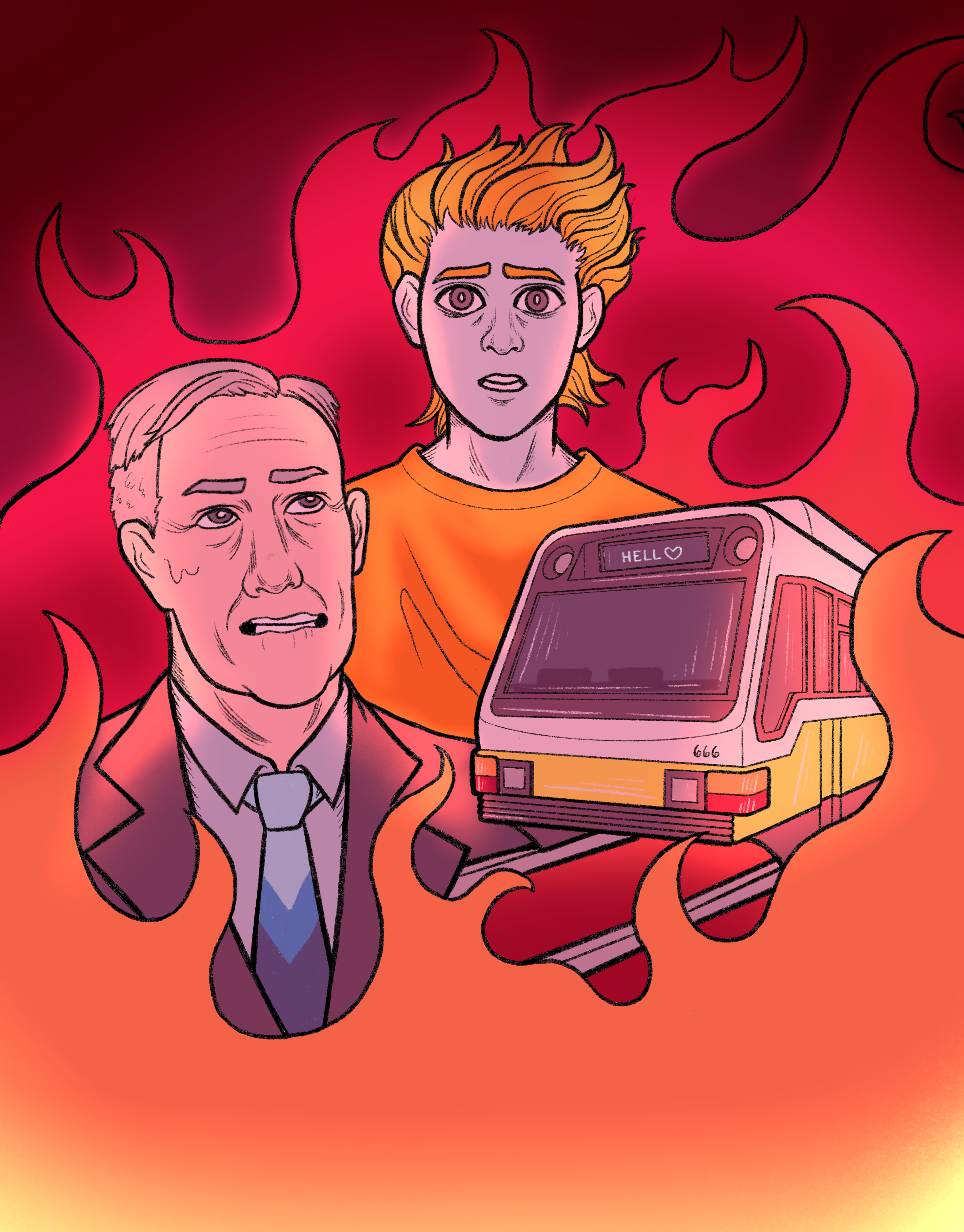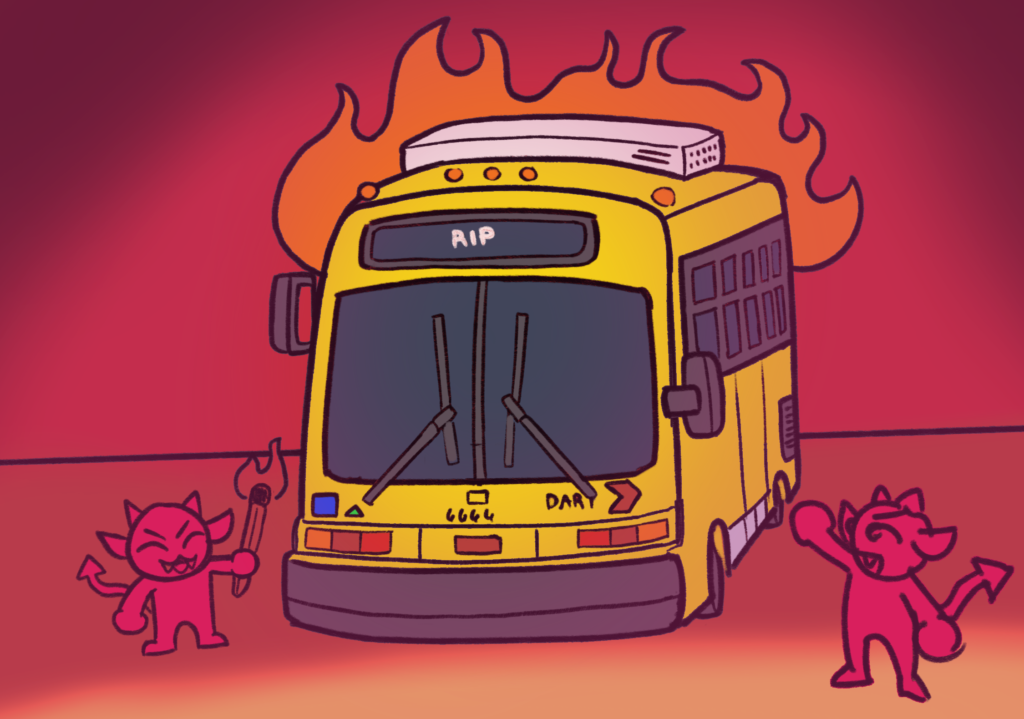
Arithmetica
Have you ever wondered if the best way to make trains work was to take away their funding? I hadn’t either until my ears were blessed by the word-sludge imparted upon me at the DART board meeting on September 26th that finalized the organization’s plans for a new fiscal year.
“My motion… is to instruct staff to work with $5 million less in their operating budget,” said Mark Enoch, the representative of Garland, Glenn Heights, and Rowlett, as he attempted to compromise between the agreed-upon budget terms for DART and Paul Wageman’s insistence that DART have its funding reduced by $25 million during the final hours of discussion.
I will concede that I am not an economics major, but the notion that drastic last-minute budget cuts and demands that millions of dollars appear from some mysterious elsewhere seems farcical at best. Public transportation is incredibly important for urban communities, but no one will want to use it when it consistently fails to meet their needs. I love trains and buses — I yearn for them, and yet Paul and Mark want to take that from our communities. Their math just doesn’t add up, because increased funding improves the services provided by DART, which in turn increases the number of riders. Perhaps people that actually want to support public transport should be overseeing public transport organizations. I recognize that October has just ended, but that doesn’t necessitate the presence of ghouls in positions of power.
Lethargo
Effort is a difficult thing to give, but one would presume that those on a board of directors for Dallas’ public transport agency would put in a modicum of effort when conducting their affairs. I just constantly kept asking myself: is this honestly an official meeting, or is this perchance just an elaborate performance meant to deter my civic activism? There was an almost alarming lack of procedural awareness and care throughout all of the DART board’s proceedings: more time was spent wondering if elevators fell under the jurisdiction of landscaping rather than discussing, debating, and voting. It was just disheartening to see these unelected officials lackadaisically flail about. That disappointment soon turned to fury as I came to the realization that the chief perpetrator of the most absurd claims being presented, Paul Wageman, was the representative of the city of Plano, a city which has been on a campaign of slow, obstructive, and petty withdrawal from DART as a whole.
Jon-Bertrell Killen of Dallas pointed this out when he said, “…Cities are actively going to legislature, trying to pull out of DART. And then they also want to say ‘I want to have a firm hand in guiding the future and choosing where the service plans are,’ that just don’t add up.”
Killen emphasizes the hypocrisy demonstrated by Wageman and his ilk in their ravenous attempts to jeopardize the efforts of DART while actively making efforts to leave the organization. ‘Fiscally conservative’ brutes like Wageman somehow fail to grasp procedure and math to the point of slowing down all meetings, but they are incredibly energetic in their efforts to leave the very institution they want to dismantle.
Tempus
The life of a student, worker, and just honestly any adult person is incredibly busy. We are constantly rushing from work to school to errands to appointments and so forth, and time isn’t something that can be spared in most of these instances. I can’t just arrive 2 hours late to my doctor’s appointment and still expect to be treated, yet frequency issues and delays make it so that this is the kind of setback you have to plan around when using DART. Students ought to be able to use public transit to safely get to and from appointments, celebrations, and any number of events, yet the current DART service hours, frequencies, and delays simply do not allow for this to be viable. However, Tier 2 is a proposed DART plan for a redesigned bus network with significantly higher frequencies for all routes, longer service hours, and the creation of new lines throughout the network, which could solve all of that.
A UTD student named Connor said, “When I saw the Tier 2 DART plan, I was just amazed by how much better this would make my life. I really like using DART during the rush hour; however, outside of the rush hour it can be rough. You can be dealing with 40 minute waits or even deciding whether you rush out of the store now to catch the bus or take your time and wait an additional hour for the next bus.”
DART has the plans that would fully revolutionize the DART system by making it a viable option for countless people, yet this plan has as of now not been implemented. Why🙹 Why must Wageman and his vile cohort strip me of trains and buses? The main obstacle to using them is timing, and DART has the plans already prepared, but they aren’t being implemented because some old rich guys don’t see it as immediately profitable. Aaaaaaah!

Frequentia
Sorry, anyways… frequency is really important. If buses and trains were running their routes as frequently as Wageman made me want to die during every minute in DART meetings, then there wouldn’t even be a need for cars whatsoever. Trains and buses everywhere at all times. Tragically, this is not the case.
Connor also said that, “On weekends it can be really difficult to use the [DART] system because of the issues with frequencies. Sometimes I just stay home instead of using DART out of convenience.”
I really felt this statement at my core. I want to go out and do more things, but I also don’t want to spend hours in the indecipherable Texas weather as I wait in vain for a bus or train to show up and ferry me to my location.
Devan, a UTD student that has also faced the unquenchable horror of public transport in Plano, said, “If you want to go anywhere that isn’t on the 883; if you want to go into downtown Richardson, if you want to go up into Plano; good luck. I mean, we are looking at 30, 40, even hour long headways if you are lucky and manage to be within the short service hours.”
Increasing frequency is a necessary step that not only improves the DART network as a whole, but also works to resolve pre existing issues like accessibility, delays, and inexorable disdain for Paul Wageman. If I am happily enjoying a train ride, then I can’t sit in silent fury contemplating my disdain for Wageman. It’s honestly a win for everyone to increase the frequency of the buses and trains via implementing the planned Tier 2 network.
Accessibilitas
The issues we’ve already discussed regarding timing and frequency combine to create such an inconvenient and unintelligible mess that the DART isn’t really accessible for our needs. Cars are expensive. School is expensive. Everything is expensive, and this places a severe limit on what is and isn’t accessible to students. Public transport as limited as DART only further compounds this issue.
Sameera, a UTD student who is familiar with the mess that is the inaccessibility of DART, said, “I want DART to be better because I want to have more choice as to what businesses I patronize, and I feel like everybody has a story like this. I got my dentist bill in the mail today, and it was higher than what I would have wanted because they were out of network. But, I went to it because it was the only one close to campus. When scheduling my recent doctors appointment I was given 3 options, yet 2 of them were in Plano and would require that I take hours out of my school day to make the appointment. So I went to the one that was close even though it wasn’t the best option.”
The facade of choice is shattered once you realize that it simply isn’t feasible to go to the cheapest or highest quality locations.
Civitas
Not everyone can afford a car, yet our car-centric infrastructure makes it so that these disenfranchised communities are only further restricted. Areas like Dixon Circle, a community in south Dallas with incredibly low rates of car ownership, are dependent on public transportation to a high degree. Without public transport, a large swath of Dixon Circle would be unable to get to work, get groceries, or get medical care. And yet, DART elected to remove bus 12, this community’s main route, as part of cost cutting measures and an experiment with more expensive means of transit. Individuals from Dixon Circle have been campaigning for a restoration of their bus route, because this community truly needs it.
Public transport isn’t just a luxury for weekend outings, and it certainly shouldn’t be math class for Paul Wageman. Public transport is a vital part of many communities, and improving it will only result in more opportunities for people in all participating and neighboring areas.
Classis Bellum
The average wage for a DART employee is $17 an hour according to the figures reported by ZipRecruiter, while the average wage for an employee of the City of Dallas is within the range of $35 to $46 an hour. Even entry level jobs such as 911 Call Taker Trainee have an hourly wage of $20, which exceeds that of a DART employee.
The workers of DART are expected to make wide scale improvements to boost ridership numbers, while vultures like Wageman seek to further lower DART’s operating budget which only places an even higher burden on the employees. DART employees aren’t receiving wages which are competitive enough for the region and type of civil work they do, nor are they being paid enough to outpace the inflation of recent years. It doesn’t help that DART has gone so far as to sue the Amalgamated Transit Union local 1338, which services DART employees, as a means to get out of meeting worker’s demands.
The issues within DART won’t be fixed by merely improving routes and implementing new plans, even though that is a huge help, unless the issues facing DART’s workers are also resolved. What good is it to have more trains and buses if there is no one there to drive, clean, or maintain them? We cannot simply allow carrions like Enoch and Wageman to feast upon the cadaver of DART and its funding when the present issues are so clear and ready to be solved.
Pecuniae et Officia Corporatum
DART is run akin to a private corporation, and most of the members appointed to its board all come from the fields of banking and road economics. This executive DART board doesn’t execute the needs of the people because the individuals appointed to it specifically come from backgrounds where revenue was the only thing that mattered.
Ellie, a UTD student, said, “I was a little concerned earlier when [board members] wanted to drastically cut the budget from what the plan is, which seems a bit ridiculous to me. I don’t want to name names or anything, but people coming from a toll road agency after working there for like a decade and then coming into transit to say we don’t need funding doesn’t make sense. It isn’t like the North Texas Tollway authority would tear out a lane if tolls went down, so it seems absurd that we would respond to lower ridership by reducing funding.”
Public transportation isn’t just another private equity venture, it is a vital service upon which thousands of people depend upon. It requires long term planning and high amounts of investment to see success, and to have individuals on the board and within the organization as a whole that fail to see this is laughable. We ought to demand much more from DART, because it can do better. Other cities, such as Berlin, Prague, Shanghai, and New York City, have demonstrated that great public transit is feasible and worthwhile. Assist transit campaigns in Dallas, attend meetings, and support the workers that provide us with these services. We shouldn’t allow our trains and buses to be sullied by unelected officials.

Comments